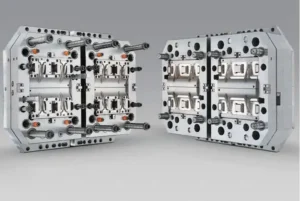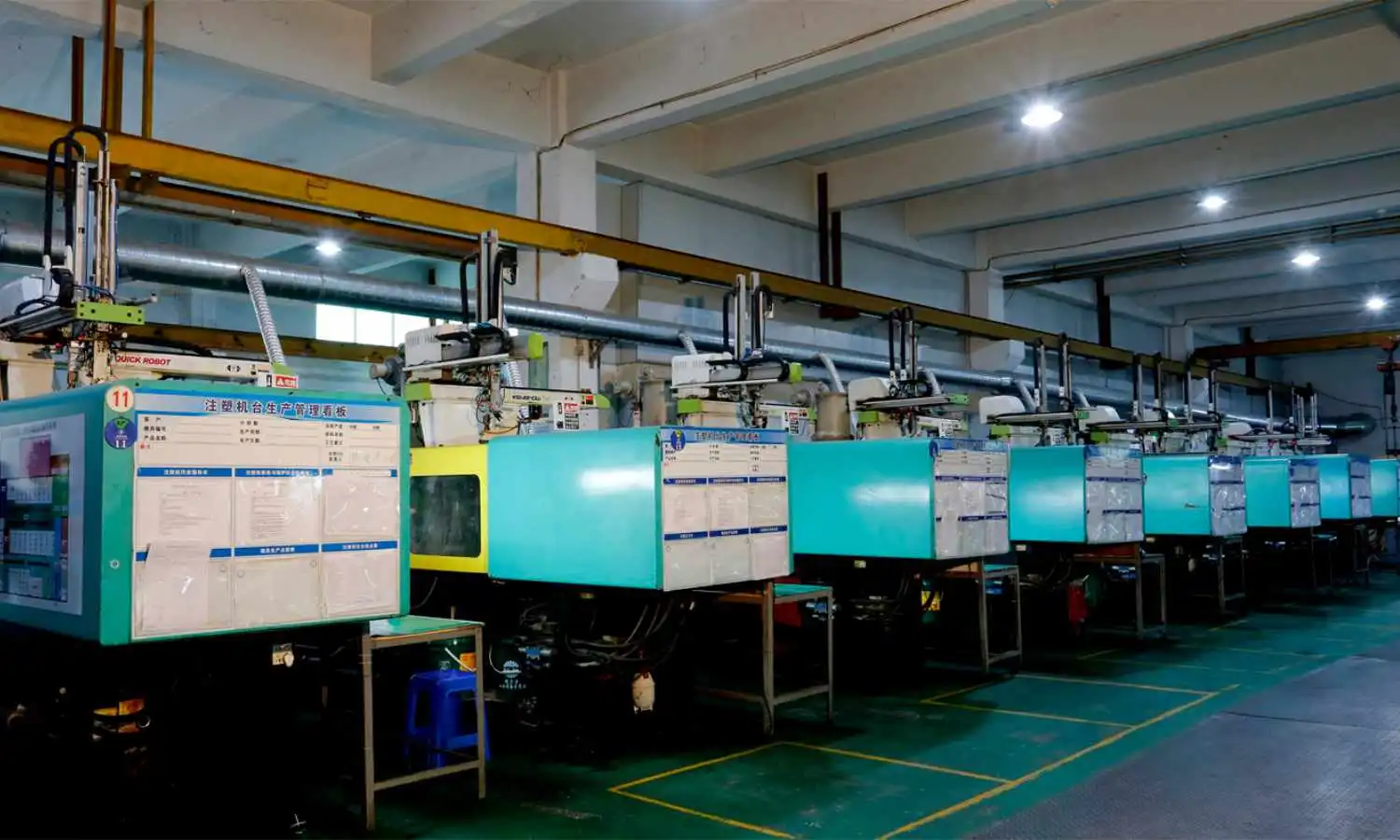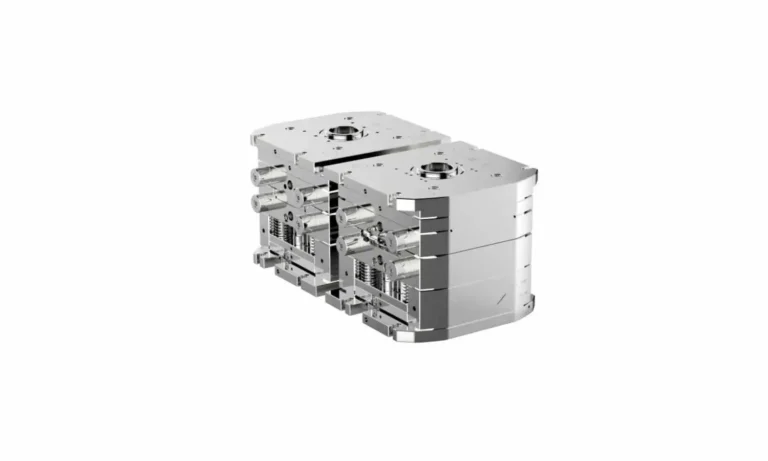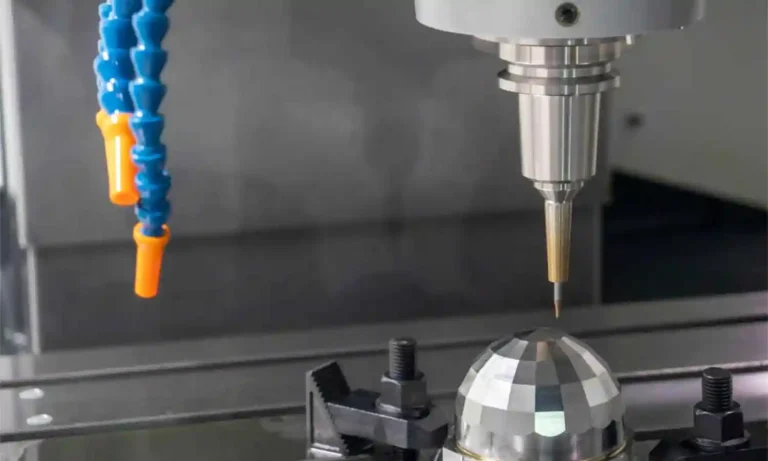Comprendre le moulage par injection
Le moulage par injection est un procédé de fabrication très répandu qui consiste à injecter un matériau fondu dans un moule afin de créer des formes et des produits spécifiques. Cette méthode est particulièrement indispensable pour la production de composants en plastique, bien qu'elle puisse également s'appliquer aux métaux, au verre et à d'autres matériaux. Le processus commence lorsque la matière première, souvent sous forme de granulés de plastique, est chauffée jusqu'à ce qu'elle atteigne un état visqueux. Cette matière en fusion est ensuite injectée sous haute pression dans un moule conçu avec précision, où elle refroidit et se solidifie pour former le produit final.
Divers matériaux sont généralement utilisés dans le moulage par injection, les thermoplastiques et les polymères thermodurcissables étant les plus courants. Les thermoplastiques, tels que le polypropylène et le polystyrène, peuvent être refondus et recyclés, tandis que les thermodurcissables, tels que les résines époxy, prennent une forme permanente après chauffage et ne peuvent être refondus. Le choix du matériau dépend des propriétés souhaitées pour le produit final, notamment la durabilité, la flexibilité et la résistance aux produits chimiques.

Les applications du moulage par injection couvrent une grande variété d'industries. Dans l'industrie automobile, le moulage par injection est utilisé pour créer des éléments de tableau de bord, des pare-chocs et diverses pièces intérieures. L'industrie électronique utilise ce procédé pour produire des boîtiers et des connecteurs, tandis que le secteur médical bénéficie de pièces moulées par injection de haute précision utilisées dans les appareils et les emballages pharmaceutiques. En outre, les produits de consommation, les jouets et les emballages tirent également parti des avantages du moulage par injection pour la production de grands volumes et la rentabilité.
Compte tenu de la complexité et des exigences techniques du processus de moulage par injection, il est essentiel de choisir le bon fournisseur de moules d'injection. Un fournisseur réputé garantit non seulement la qualité et la précision des moules, mais apporte également son expertise en matière de sélection des matériaux et d'optimisation des processus. Prendre une décision éclairée lors du choix d'un fournisseur peut avoir un impact significatif sur la réussite de vos projets de moulage par injection, en affectant les performances du produit, la vitesse de production et la rentabilité globale.
Évaluer l'expérience et l'expertise des fournisseurs
Lors de la sélection d'un fournisseur de moules d'injection, il est essentiel de connaître son expérience et son expertise. Un fournisseur établi possède non seulement les compétences techniques nécessaires à une production de haute qualité, mais aussi une connaissance inestimable du secteur qui peut contribuer de manière significative à la réussite de vos projets. Le processus de moulage par injection exige précision et innovation ; par conséquent, travailler avec un fournisseur qui a fait ses preuves peut atténuer les risques potentiels et garantir des résultats optimaux.
Pour évaluer les compétences techniques d'un fournisseur, il est utile de se pencher sur son histoire dans le secteur du moulage par injection. Analysez son portefeuille et renseignez-vous sur sa participation à des projets similaires au vôtre. Vous pourrez ainsi évaluer sa capacité à utiliser les technologies et techniques de moulage les plus récentes. Il est également prudent d'explorer les matériaux et les composants avec lesquels ils ont l'habitude de travailler, car les industries spécifiques requièrent souvent une expertise sur mesure en matière de sélection des matériaux et de méthodes de traitement.
En outre, étudiez les services spécifiques offerts par les fournisseurs potentiels. De nombreux fournisseurs de moules à injection se spécialisent dans des domaines particuliers, tels que la conception de moules sur mesure, le prototypage ou la gestion des cycles de production. Il est essentiel de savoir si un fournisseur peut fournir des solutions complètes ou s'il n'excelle que dans certains aspects pour aligner ses capacités sur les exigences de votre projet. Une approche globale des services pourrait rationaliser le flux de travail, réduire les délais et les coûts, ce qui constituerait une bonne raison de choisir certains fournisseurs plutôt que d'autres.
En outre, les projets antérieurs d'un fournisseur peuvent servir d'indicateurs importants de ses compétences. Demandez des études de cas ou des témoignages qui illustrent leur expérience, les défis qu'ils ont relevés et le degré de satisfaction de leurs clients. En corroborant leurs affirmations par des sources externes, vous pourrez mieux comprendre leur fiabilité et leur historique de performances, et vous assurer qu'ils sont bien placés pour répondre efficacement à vos besoins en matière de moulage par injection.
Évaluation des normes de qualité et des certifications
Pour choisir le bon fournisseur de moules à injection, il faut bien comprendre les normes de qualité et les certifications qui régissent l'industrie du moulage par injection. Les principales sont les certifications ISO (Organisation internationale de normalisation), qui sont des indicateurs essentiels de l'engagement d'un fournisseur en faveur de la qualité et de l'efficacité opérationnelle. La norme ISO 9001, par exemple, est axée sur les systèmes de gestion de la qualité et garantit que les fournisseurs satisfont systématiquement aux exigences des clients et de la réglementation. Cette certification peut accroître considérablement la certitude que les moules produits respecteront les tolérances et les performances opérationnelles spécifiées.
Une autre certification notable dans ce contexte est la norme ISO 13485, spécifiquement applicable aux dispositifs médicaux, qui souligne l'importance de processus rigoureux de contrôle de la qualité dans les environnements de fabrication. Les fournisseurs titulaires de ces certifications démontrent leur capacité à maintenir des normes élevées tout au long de leurs processus opérationnels, garantissant ainsi aux clients la fiabilité des moules et des produits finis qui en sont issus.
Les processus de contrôle de la qualité constituent l'épine dorsale d'un solide système de gestion de la qualité. Ils englobent les différentes étapes de la production, depuis la sélection des matériaux jusqu'aux inspections finales. Un fournisseur qui applique des mesures rigoureuses de contrôle de la qualité ne se contente pas d'atténuer les risques de défauts, il améliore également la satisfaction de ses clients à long terme. Ces mesures peuvent comprendre l'entretien régulier des équipements, l'essai des prototypes de moules et le respect de directives spécifiques dans les flux de production. En analysant les pratiques de contrôle de la qualité d'un fournisseur potentiel, les fabricants peuvent évaluer sa capacité à fabriquer des produits de haute qualité qui répondent aux normes rigoureuses de l'industrie.
En résumé, l'évaluation des normes de qualité et des certifications est une étape cruciale dans la sélection d'un fournisseur de moules à injection. Les fournisseurs qui adhèrent à des certifications de qualité reconnues et qui mettent en œuvre des processus de contrôle de la qualité efficaces sont plus susceptibles de fournir des produits qui répondent aux spécifications et aux attentes précises des clients. Cet engagement en faveur de la qualité a un impact direct sur l'intégrité et les performances des moules et des produits finis qu'ils contribuent à créer.
Explorer les capacités technologiques
Lors de la sélection d'un fournisseur de moules à injection, il est primordial d'évaluer ses capacités technologiques. Le secteur du moulage par injection a considérablement évolué au cours des dernières décennies, intégrant des machines avancées et des logiciels de pointe pour améliorer le processus de fabrication. Les fournisseurs de moules à injection modernes utilisent souvent des systèmes robotisés et un usinage CNC avancé pour accroître la précision, réduire le temps de production et améliorer la qualité globale du produit.
L'un des éléments clés à prendre en compte est le type de machines utilisées par le fournisseur. Les fournisseurs qui ont investi dans des machines de moulage par injection de pointe sont susceptibles d'être plus efficaces et plus productifs. Ces machines de pointe sont souvent équipées de moules multi-empreintes, qui permettent la production simultanée de plusieurs pièces, maximisant ainsi le rendement tout en réduisant les temps de cycle. En outre, l'automatisation robotique peut rationaliser la manutention des matériaux et le retrait des pièces, ce qui optimise encore l'efficacité de la production.
Un autre aspect important à examiner est celui des systèmes logiciels utilisés par le fournisseur pour les processus de conception et d'ingénierie. Les programmes de conception assistée par ordinateur (CAO) et de fabrication assistée par ordinateur (FAO) améliorent le processus de conception des moules, permettant la création de géométries complexes avec une précision irréprochable. En outre, les fournisseurs qui utilisent des logiciels de simulation peuvent prévoir et résoudre les problèmes potentiels avant le début de la production, ce qui permet de gagner du temps et de réduire les coûts associés au prototypage et au retraitement.
Pour déterminer si un fournisseur potentiel de moules à injection est au fait des avancées de l'industrie, renseignez-vous sur ses récents investissements en matière de technologie et de formation. Un fournisseur avant-gardiste participera souvent à la formation continue et à l'adaptation aux nouvelles techniques de fabrication. Il doit également s'engager à adopter les meilleures pratiques en matière de technologie de production, ce qui lui permet de répondre à l'évolution des exigences du marché. L'évaluation de ces capacités technologiques vous permettra de prendre une décision éclairée lors de la sélection du fournisseur de moules à injection qui répondra à vos besoins.
Communication et soutien aux fournisseurs
Une communication efficace et un soutien solide de la part de votre fournisseur de moules à injection sont des éléments essentiels qui peuvent influencer de manière significative la réussite d'un projet. L'établissement d'une ligne de communication claire garantit que toutes les parties restent informées de l'évolution du projet, des délais et des difficultés potentielles. Lors de l'évaluation d'un fournisseur, il est important d'évaluer sa réactivité aux demandes de renseignements, qui reflète son engagement en matière de service à la clientèle. Un fournisseur fiable répondra rapidement aux courriels et aux commentaires, démontrant ainsi son souci du détail et sa volonté de résoudre les problèmes éventuels.
La collaboration est un autre facteur clé dans la relation avec votre fournisseur de moules d'injection. Un fournisseur qui favorise un environnement de collaboration peut améliorer les capacités de résolution des problèmes. Recherchez des fournisseurs qui encouragent un dialogue ouvert, en offrant des points de vue et des suggestions qui peuvent contribuer à l'ensemble des processus de conception et de fabrication. Lorsque votre fournisseur s'engage dans des discussions continues sur les meilleures pratiques en matière de conception de moules ou de sélection de matériaux, il s'agit d'un partenariat qui peut avoir un impact positif sur la qualité et les performances du produit final.
L'assistance tout au long des différentes phases du projet est primordiale. Choisissez un fournisseur qui vous assiste non seulement pendant la phase de conception initiale, mais aussi pendant les phases de fabrication et de post-production. Évaluez sa capacité à offrir des conseils sur la résolution des problèmes et l'optimisation des processus au fur et à mesure de l'évolution du projet. En outre, tenez compte des ressources qu'il consacre à l'assistance à la clientèle, telles qu'un personnel technique expérimenté qui peut apporter son expertise en cas de besoin. En donnant la priorité à la communication et à l'assistance dans votre processus de sélection des fournisseurs, vous pouvez améliorer la collaboration et vous assurer que votre projet de moulage par injection se déroule sans heurts, du début à la fin.
Examen de la tarification et de la stabilité financière
Lors de la sélection d'un fournisseur de moules d'injection, l'évaluation de ses structures de prix est un aspect critique qui peut grandement influencer la réussite globale de votre projet de fabrication. Il est essentiel de comprendre le coût total de possession (CTP), car il englobe non seulement le prix initial des moules, mais aussi tous les coûts supplémentaires qui peuvent survenir tout au long du processus de production. Cette approche globale vous permet de prendre une décision éclairée qui tient compte des implications financières à court et à long terme.
Les conditions de paiement proposées par le fournisseur constituent un facteur clé dans l'évaluation des prix. Ces conditions peuvent varier considérablement d'un fournisseur à l'autre et peuvent inclure des paiements initiaux, des étapes au cours de la production ou des périodes de paiement net après la livraison. Comprendre ces conditions vous permet d'évaluer l'impact financier immédiat sur votre budget et votre trésorerie. En outre, la flexibilité des paiements peut souvent être un point de négociation, influençant l'accord final et favorisant les possibilités de réduction des coûts.
En outre, la négociation des prix avec les fournisseurs potentiels est un élément fondamental du processus. De nombreux fournisseurs peuvent proposer des prix fixes, tandis que d'autres peuvent accorder des remises en fonction du volume des commandes ou des contrats à long terme. Il est essentiel d'aborder cette question en ayant une idée claire de votre budget et de vos attentes afin d'obtenir des conditions favorables sans compromettre la qualité.
Enfin, il est primordial d'évaluer la santé financière du fournisseur de moules à injection. Un fournisseur financièrement stable est plus à même de livrer les projets dans les délais et de maintenir une qualité constante, minimisant ainsi les risques liés aux retards ou aux coûts imprévus. Les évaluations financières peuvent inclure l'examen des cotes de crédit, des antécédents de paiement et de la longévité opérationnelle dans l'industrie. En veillant à ce que le fournisseur que vous avez choisi fasse preuve à la fois de prix compétitifs et d'une solide stabilité financière, vous pouvez favoriser un partenariat fiable qui contribuera à la réussite de vos projets de fabrication.
Vérifier les références et les avis des clients
Lors de la sélection d'un fournisseur de moules d'injection, il est primordial de faire preuve d'une grande diligence. L'un des moyens les plus efficaces d'y parvenir est de demander des références et d'examiner les commentaires des clients. Ces deux éléments peuvent fournir des indications précieuses sur la fiabilité du fournisseur, la qualité de son travail et son expérience globale du service. La volonté d'un fournisseur de fournir des références est souvent une indication de sa confiance dans la qualité de son travail et de son engagement à satisfaire le client.
Lorsque vous contactez des références, il est essentiel de poser des questions précises sur les performances du fournisseur. Renseignez-vous sur son expérience en matière de délais de réalisation des projets, d'efficacité de la communication et de qualité générale des moules produits. Par exemple, vous pouvez poser les questions suivantes "Le fournisseur a-t-il toujours respecté les délais du projet ?" ou "Avec quelle efficacité a-t-il relevé les défis qui se sont présentés au cours du processus de production ?" En outre, il peut être utile de demander aux références si elles envisageraient de travailler à nouveau avec le fournisseur - un indicateur simple mais révélateur de leur satisfaction.
Parallèlement à la vérification des références, l'examen des commentaires des clients peut révéler des tendances plus générales sur la réputation du fournisseur. Les avis en ligne, les témoignages et les commentaires sur les médias sociaux peuvent donner un aperçu des expériences de divers clients. Lors de l'évaluation de ces commentaires, recherchez les thèmes récurrents, tels que les discussions sur la précision des résultats moulés, les structures de prix et le support après-vente. Portez une attention particulière aux affirmations positives et négatives ; quelques critiques ne sont pas nécessairement rédhibitoires, mais les tendances à l'insatisfaction doivent vous mettre la puce à l'oreille.
En fin de compte, la combinaison de vérifications approfondies des références et d'une évaluation minutieuse des commentaires des clients vous permettra non seulement de mieux comprendre les fournisseurs potentiels, mais aussi de protéger votre investissement dans la production de moules de haute qualité.
Considérations géographiques et logistiques
Lors de la sélection d'un fournisseur de moules à injection, la situation géographique du fournisseur joue un rôle crucial dans la détermination des délais, des coûts d'expédition et de la logistique globale de votre projet. Les fournisseurs situés plus près de vos installations de fabrication offrent généralement des avantages significatifs en termes de réduction des coûts de transport et de délais de livraison plus rapides. Cette proximité géographique peut améliorer la communication et la collaboration, ce qui permet un processus de fabrication plus souple et des réponses plus rapides aux problèmes qui peuvent survenir.
L'une des principales considérations lors de l'évaluation des fournisseurs locaux est leur capacité à fournir une assistance et un service en temps voulu. Les fournisseurs locaux peuvent se rendre fréquemment sur place, ce qui permet de mieux gérer les relations et d'effectuer des contrôles de qualité sans avoir à se déplacer. En outre, un fournisseur local peut mieux comprendre les demandes et les tendances du marché régional, ce qui permet de proposer des solutions mieux adaptées à vos besoins spécifiques.
D'autre part, si les fournisseurs étrangers peuvent souvent proposer des prix plus bas en raison de la réduction des coûts de main-d'œuvre et de production, ils présentent des difficultés particulières. Des délais d'expédition plus longs peuvent retarder le calendrier de votre projet et introduire des risques liés à l'expédition internationale, tels que le dédouanement et les droits de douane potentiels. En outre, les différences de fuseaux horaires peuvent compliquer la communication, ce qui pose des problèmes pour traiter les questions urgentes ou pour apporter les ajustements nécessaires aux conceptions ou aux calendriers de production.
Il est également essentiel de prendre en compte l'impact de la logistique lorsque vous choisissez entre des fournisseurs locaux et des fournisseurs étrangers. Si les fournisseurs locaux peuvent livrer plus rapidement, les fournisseurs étrangers peuvent offrir des capacités de production plus importantes, ce qui vous permet de répondre aux demandes de gros volumes. L'évaluation des exigences de votre projet, y compris le budget, le calendrier et la qualité souhaitée du produit, vous permettra de déterminer la meilleure option géographique pour votre fournisseur de moules à injection.
Prendre la décision finale
Le choix du bon fournisseur de moules d'injection est un processus critique qui doit être abordé avec une attention particulière et une évaluation approfondie. Pour vous aider à prendre cette décision finale, un cadre clair ou une liste de contrôle peut s'avérer utile pour comparer les fournisseurs potentiels sur la base des critères clés évoqués précédemment.
Tout d'abord, évaluez l'expérience du fournisseur dans le secteur du moulage par injection. Recherchez des preuves de ses antécédents, notamment de sa durée d'activité et de son expertise dans votre domaine d'application spécifique. Cette expérience est souvent synonyme de qualité et de fiabilité. Veillez à évaluer son portefeuille ou ses études de cas relatives à des projets similaires au vôtre, car cela peut vous donner une idée de ses capacités.
Deuxièmement, tenez compte des processus de contrôle de la qualité mis en place par chaque fournisseur. Demandez des documents décrivant leurs normes et procédures d'assurance qualité. Un bon fournisseur doit être transparent sur ses processus d'inspection et fournir des certifications attestant du respect des normes industrielles reconnues, telles que les certifications ISO.
Examinez ensuite leurs capacités technologiques. Les fournisseurs doivent disposer de l'équipement et des logiciels nécessaires à la conception, au prototypage et à la production de moules. Il convient également d'examiner leur capacité à proposer des solutions innovantes ou des personnalisations susceptibles de répondre aux besoins de votre projet. La présence de technologies de pointe telles que les systèmes de CAO/FAO ou l'usinage CNC peut être un indicateur fort d'une activité moderne et efficace.
En outre, tenez compte de la communication et de l'assistance à la clientèle du fournisseur. Une bonne communication peut faciliter le déroulement d'un projet ; évaluez donc sa réactivité et sa volonté de s'impliquer tout au long du processus. De même, évaluez ses capacités logistiques, y compris les délais et les options d'expédition.
Enfin, rassemblez les informations recueillies dans un tableau comparatif. Cet outil visuel peut vous aider à déterminer quels fournisseurs répondent à vos exigences en fonction de divers critères, ce qui facilite le processus de prise de décision. En suivant cette approche structurée, vous pouvez vous assurer que votre sélection d'un fournisseur de moules à injection correspond aux objectifs et aux attentes de votre projet.



